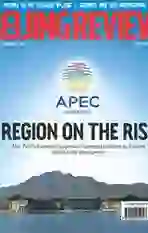Beijing Talks Determine Region’s Future
2014-12-01
As Beijing hosts the 2014 Asia-Pacific Economic Cooperation (APEC) meetings from November 5 to 11, shaping the future through regional collaboration and partnerships will serve as the general theme of the talks.
This is the second time that China has hosted the APEC meetings since joining the organization in 1991. China hopes to assist in moving forward the successes APEC has achieved in economic and trade areas, which will benefit the region now and in the future. China also hopes to contribute more to common prosperity and development in the Asia-Pacific region.
Relying heavily on the surrounding region for its foreign economic and trade activities, a large part of Chinas international trade and foreign capital investment are to and from other APEC members, and the nations development has benefited greatly from this regional economic cooperation.
At the same time, Chinas development is assisting in the growth and expansion of APEC. For example, in coping with the global financial crisis in 2008, apart from adopting incentive policies to stabilize economic growth within the country, the Chinese Government expanded its cooperation with other APEC members, helping contribute to the restoration of the world economy. The Chinese Government also established a fund in 2009 to support Chinese companies participation in APEC economic collaboration.
As the world economy moves toward the post-financial crisis era, with the Asia-Pacific region being the most economically active, it is thus expected to take on the responsibility of becoming the driving force behind the international economy. Asia-Pacific partnerships will be crucial to world peace and development; as such, these partnerships must feature mutual political trust, close economic ties and harmonious growth. To this end, China has always played an active role in pushing forward future-minded regional cooperation, as evidenced through the China-ASEAN Free Trade Area, the 21st Century Maritime Silk Road, and talks on a China-Japan-South Korea free trade area. China is also committed to supporting multilateral trade, opposing trade protectionism, connecting global value and supply chains and promoting regional economic and technological cooperation.
yet as the world economy struggles to fully recover, the Chinese economy, which has stayed strong for decades, also appears to be slowing down. It is thus necessary for APEC economies to work collaboratively to prevent a second worldwide financial slump.
Twenty-five years since its founding, APEC has evolved into the highestlevel economic cooperative mechanism in the region. The future development of the Asia-Pacific region will depend on the level of cooperation among APEC members, especially as it faces challenges from the Trans-Pacific Partnership Agreement and the Transatlantic Trade and Investment Partnership. Thus, maintaining APECs cohesion while functioning across new economic platforms will influence all members trade and cooperation methods. In this sense, this years APEC meetings will play not only a regional but a global role.
